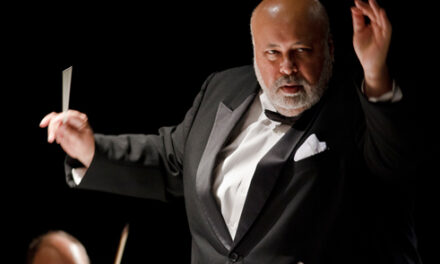William McClelland: The Revenge of Hamish and Other Choral Works. William Appling Singers & Orchestra conducted by William Appling. Recorded at the American Academy of Arts and Letters, New York City, and KAS Music Sound, Flushing, New York. Albany Records, Troy 614, TT 72:17, ©2003, $16.95, http://www.albanyrecords.com/.
Michigan native William McClelland received a degree in composition from the Longy School of Music in Cambridge, Massachusetts, and both national and international ensembles have commissioned his works. As a keyboard player, he has performed for productions at the New York Shakespeare Festival and Dance Theater Workshop and, as a soloist McClelland has premiered works by such composers as Charles Ruggles and John Cage. He also presents concerts of American song with his wife, soprano Jean McClelland. Besides leading a jazz septet, The Feetwarmers, he composes for the group, plays piano, and sings. McClelland writes, “growing up in the late 1950s and early 1960s, I was …part of a family with a wide range of musical interests-from big band and early jazz to standards and Broadway show tunes to opera and other classical music.” The selections on this CD, The Revenge of Hamish and Other Choral Works, reflect this broad span of musical influences. The music manages to be listener-friendly without any pandering.
The composer’s practical activity as an environmentalist is reflected in one of the fourteen selections, “Collect Pond.” McClelland and his brother Tim developed a snagging tool for removing plastic bags from trees. The park that has received their special efforts is the source of the song’s name while the text was written by Tim.
One of the most striking selections is “The Ballad of Don and Dan” which is based on a 1984 kidnapping and double murder case in Western Montana. Father and son Don and Dan Nichols, two dimwits on a survivalist fantasy, kidnapped an Olympic athlete to become Dan’s mate. They murdered two of the woman’s friends who had tried to rescue her. Writer Ian Frazier turned notes for a magazine article into an intriguing free verse ballad. McClelland’s setting of the text is appealing and witty with a recurring refrain, variations on “It was an idea, and it didn’t work.” Effective use is made of fine soloists from within the chorus and the text is imaginatively tossed between different sections of the chorus. Livelier portions are accompanied by a small jazz combo with prominent percussion and guitar. Top university choruses ought to consider this for their touring repertory.
Most of the selections make use of minimal forces, most often piano accompaniment. “The Revenge of Hamish” is the longest work (19:08) and gives the album its title. It is a splendid setting of the Sidney Lanier poem and makes use of the largest forces – a few violins, double-bass, woodwinds, horn, and percussion. The scoring is very evocative; at times the strings suggest the droning sounds of bagpipes. The clear and subtle use of the chorus and instrumental ensemble sustains the dramatic buildup to the tragic murder of the bairn (in Scotland a child: son or daughter). A glossary of Scottish words used in the poem is included in the fine CD booklet, along with full texts.
A capella singing is featured in “Five Sonnets for Men’s Voices,” which are appealing arrangements of poems as diverse as Edna St. Vincent Millay’s “Oh, Think Not I Am Faithful to a Vow!” and e. e. cummings’s “i have found what you are like.” The choir’s crisp diction and warm tone are sure to please.
Part of choral director William Appling’s apprenticeship was the first Kulas Foundation Fellowship for Choral Conducting with the Cleveland Orchestra, assisting George Szell and Robert Shaw. Among his impressive activities was the founding of the William Appling Singers and Orchestra in 1979, which is made up of some of the finest professional singers and instrumentalists in the New York area. In addition to a repertory that covers all periods, the ensemble has premiered and performed many contemporary American composers. This CD is the WASO’s second recording to feature contemporary American composers. Stresses in the Peaceable Kingdom presented a selection of the choral music of Richard Wilson on Albany Troy 333.











